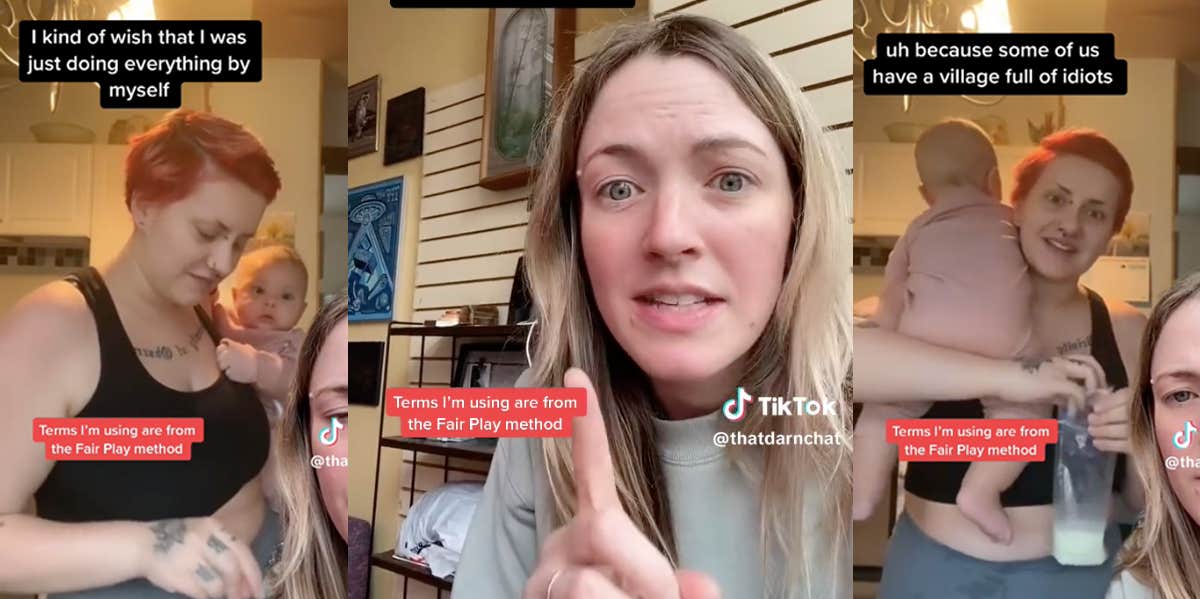Parent Rejects 'It Takes A Village' Saying & Wishes They Were Doing Everything Alone—'Some Of Us Have A Village Full Of Idiots'
How is support meaningful if it causes more problems than it solves?
 TikTok
TikTok The saying “It takes a village to raise a child” is a famous African proverb that has become popularized in the Western world as a means of expressing the importance of community support when it comes to families.
The saying has a lot of power and posits that a child grows up healthiest when they have a whole village of adults to positively interact with and rely on in different ways. Through this type of thinking, many children can be exposed to new ideas and new skills that their parents may not be able to teach them, and will have a more well-rounded understanding of the world around them.
However, for that to work, the metaphorical village has to have the child’s best interests in mind, something that doesn’t always happen in reality.
One parent took to Tik Tok to disagree with the saying 'it takes a village,' and here’s why.
TikTok user @spit.the.dude is a 27-year-old transgender parent of a toddler. Although they are trans and use they/them pronouns, they refer to themself as a mom.
In their now-taken-down TikTok, the parent discussed how frustrating it is for them to rely on a whole village of people that seem to only make their struggles work.
“I kind of wish I was just doing everything by myself,” they vented. “Because then there would be no room for disappointment.” They further explained that they didn’t want to be ungrateful to people helping them out, but it became frustrating when the help was incomplete or otherwise faulty.
“It’s not helpful when I end up having to do ten times more f---ing work.”
In response to their impassioned rant, TikTok user @thatdarnchat — real name Laura — stitched the video to discuss a strategy of relationship communication using terms from the “Fair Play Method,” coined by Eve Rodsky.
The Fair Play method is actually a card game meant to bring invisible responsibilities such as emotional labor, household chores, caregiving, and more into the light. It can be facilitated by therapists or done on one’s own, but it is meant to open up conversations about responsibilities and help couples reach a consensus. The idea of it can also be used just in conversation as Laura does in her video.
Laura mentions that an unfair division of labor is the root problem of what the parent is feeling frustration about — there is a problem in their life, and they are being forced to bear a larger portion of the burden than those around them.
They aren’t alone in this feeling. Laura points out that when she asked her Instagram followers if they felt similarly, she received dozens of responses all describing different unfair ways people felt they had to pick up the slack of a partner’s labor.
“How many of us have felt this, at work, at home, in our families, in our friendships?” She asked.
Many of her followers listed the mental toll this type of frustration has left on them. People described losing their sense of self, their ambitions, their feeling of sanity, and even their wellness. The unfair distribution of work often led people to feel resentment in their relationships, and wonder over and over, why couldn’t their partners see it?
Laura pointed out that a lack of shared investment in the planning and execution of important tasks leads to real costs in people’s lives and relationships.
Going back and having to fix an incomplete or poorly finished task is also a strain on a relationship. Laura points out that often, repeated situations like that will result in a new type of thinking: “I’m not going to ask you for help if when you help me it adds more to my plate.”
Laura describes that once that kind of thinking is reached, trust begins to erode, resentment begins to build, and relationships begin to break.
When that occurs, she suggests an age-old technique: open communication.
Sitting down with a partner and openly discussing how much the current situation is hurting, and what kinds of costs you are seeing in your life can open the door to fixing the problem.
“Where have you seen the cost,” she suggests people think about, “and where are you interested in seeing a benefit?”
Through this style of engagement and thinking, Laura hopes that people like this parent who feel overwhelmed and additionally burdened by their support system can bring their frustrations to the table and talk them through.
Of course, respect and change is a two-way street but it has to start somewhere, and making an effort to show that help needs to be more complete and actually helpful is a great place to start.
Hawthorn Martin is a news and entertainment writer living in Texas. They focus on social justice, pop culture, and human interest stories.

